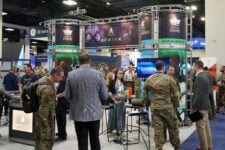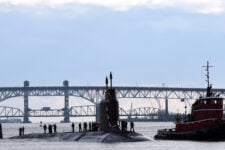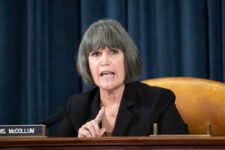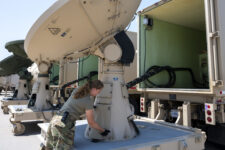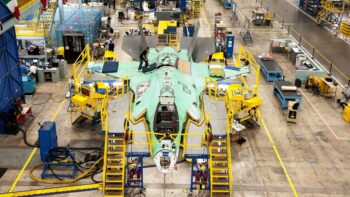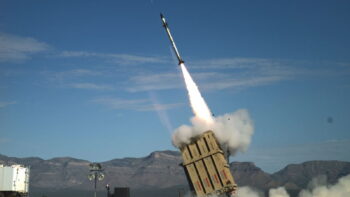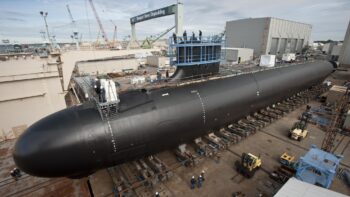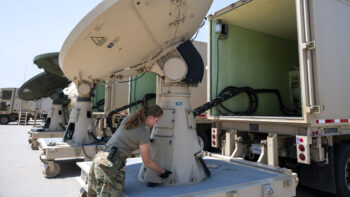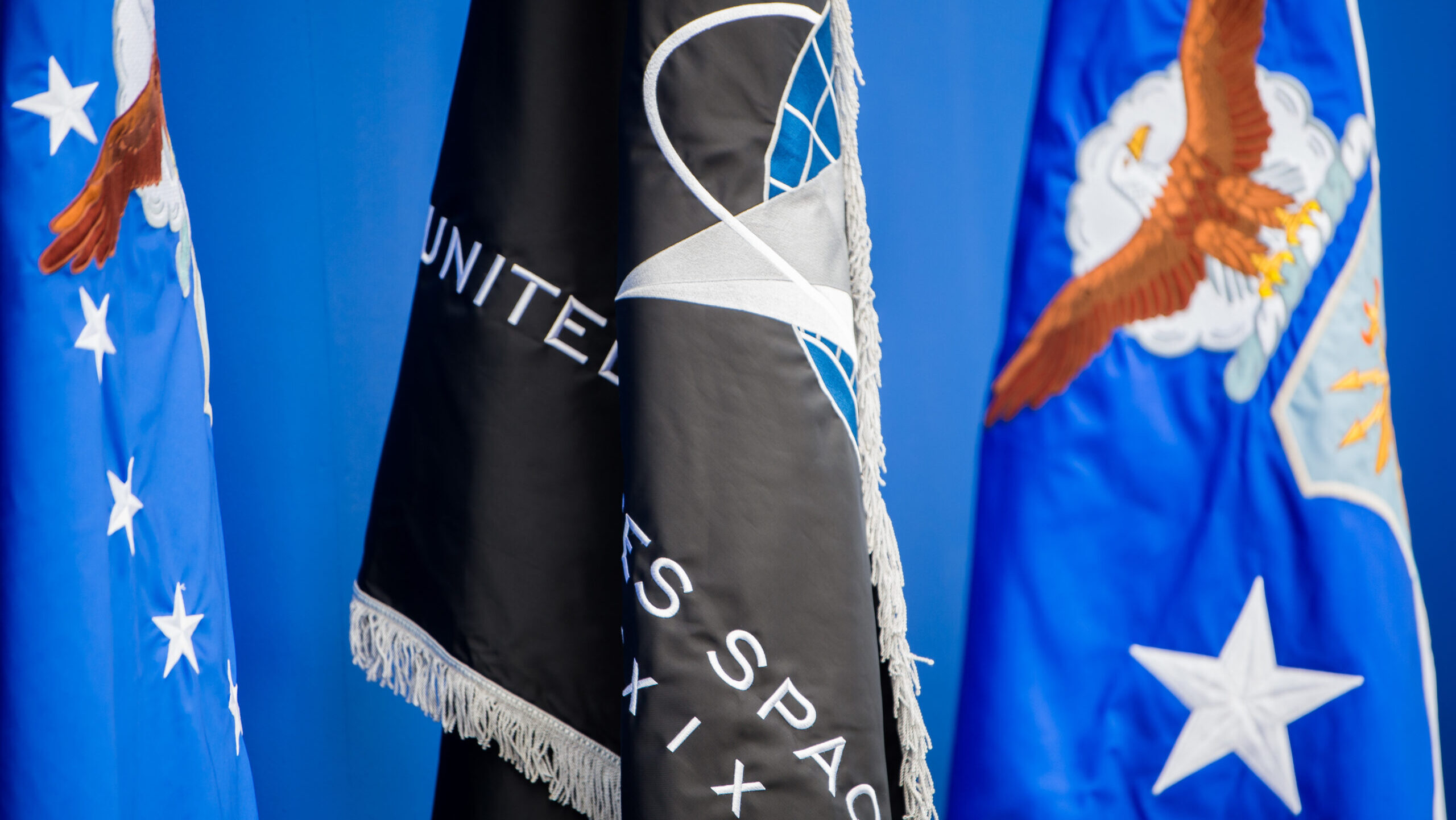
The Space Force flag rests between the Air Force and Air Force Academy flag as Lt. Gen. Richard Clark takes over as Superintendent of the Air Force Academy during a Sept. 23, 2020 Change of Command Ceremony at Falcon Stadium. (U.S. Air Force Photo by Trevor Cokley)
In December, the Space Force will turn four, and while plenty of progress has been made, the service is still being developed. In this new op-ed, longtime analyst Todd Harrison, who this week joined the American Enterprise Institute, weighs in on two legislative proposals in front of the Hill and why they would benefit America’s newest military service — and one he says should be left behind.
A lot is at stake for the Space Force in the fiscal year 2024 National Defense Authorization Act (NDAA). As the newest military service prepares to mark the fourth anniversary of its creation, the work of standing up and maturing the structure and organization of the Space Force is not yet complete. There are two things in particular the Space Force needs from Congress in this year’s NDAA, and one issue where the help Congress is offering would be counterproductive.
The first thing the Space Force needs in this year’s NDAA is a senior civilian position over the Space Force — an Under Secretary of the Air Force for Space, as originally envisioned in the legislative proposal from the Executive Branch in February 2019.
An Under Secretary position would provide the necessary rank and breadth of responsibility for effective civilian oversight of the Space Force’s budget, strategy and policy development, as well as its personnel system. When the Space Force was created, Congress adroitly recognized that a new Assistant Secretary of the Air Force for Space Acquisition and Integration was needed to give space programs the civilian oversight and attention they need to succeed. It has increasingly become clear that the same focused attention of a civilian leader is also needed at a higher level to look across all elements of the Space Force.
Moreover, now is an ideal time to make this change because the current Under Secretary of the Air Force position is vacant. Congress should split this position in two before it is filled, with one Under Secretary focused on the Air Force and the other on the Space Force.
The second thing the Space Force needs from Congress is its own independent Legislative Affairs and Public Affairs offices that report directly to the Under Secretary of the Air Force for Space. Since its creation, the Space Force has relied on “Mother Air Force” for these core functions — arguably to its own detriment. A dedicated Legislative Affairs office is critical for facilitating a candid, two-way dialog between senior Guardians and members of Congress on Space Force priorities and requirements, and a separate Public Affairs shop is needed to craft accurate and effective messages aimed at recruiting the unique talent the Space Force requires.
The Space Force should not be filtering these messages through the Air Force, where it is inherently a secondary priority. All other military services — including the Marine Corps, the most comparable service to the Space Force in structure— have their own independent offices for communicating with Congress and the public. The House version of the NDAA is already headed in the right direction by including a provision that would create a Legislative Liaison for the Space Force, but it doesn’t go far enough. The Space Force needs both a Legislative Affairs Office and a Public Affairs Office run by and for Guardians.
While the Space Force needs some additions to make itself more effective and efficient, not every addition is a good idea. Case in point: The House version of the NDAA would create a Space National Guard and establish guard units in states where the Space Force already has a significant presence.
RELATED: Top Guard space officer fears readiness loss as Space and Air Force processes diverge
Unlike reserve units, guard units report to their respective state governments. For the Army National Guard and the Air National Guard, this often makes sense so that states can independently call up and deploy these soldiers and airmen to respond to state and local emergencies under direct state control. But under what circumstances would a governor need direct control of military space forces? Space operations are inherently global, and the space capabilities that can be applied at a state and local level are coordinated and conducted at the national level.
As others have noted, there are no missions in which state and local governments need their own space forces. Moreover, once some states have Space National Guard units, it will incentivize other states to form units of their own for fear of missing out. Guard units can become flashpoints for parochial politics, which can lead to long-term structural inefficiency (just ask the Air Force). Having a reserve component of some kind is important for the Space Force, but it doesn’t need all the headaches that come with creating a Space National Guard.
As the House gets back to work under its new leadership and the two chambers hash out the differences between their respective versions of the NDAA, the Space Force should be at the top of their minds. It is time to take the next logical steps in the evolution of the Space Force by creating independent offices for Legislative Affairs and Public Affairs and establishing a new Under Secretary of the Air Force for Space. While well intentioned, establishing a Space National Guard would inevitably lead to bloat and structural inefficiency in the force. Congress should instead go back to the drawing board and consider alternative options for a space reserve component.
Even with these changes, the work of standing up the Space Force will not yet be complete—it is a work in progress that will continue to need legislative refinement for years to come. But these are two good steps Congress should take — and one it can avoid.
Todd Harrison is the senior fellow on the Foreign and Defense Policy team at the American Enterprise Institute.
House lawmaker hopes to resuscitate DoD’s venture fellowship program
Rep. Elise Stefanik criticized the Air Force’s decision to terminate a fellowship program that paired DoD personnel with the private sector as “shortsighted and misguided,”
